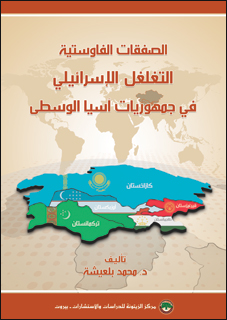Al-Zaytouna Centre for Studies and Consultations has published a new book entitled “Faustian Bargains: Israeli Penetration of the Central Asian Republics,” in Arabic, offering the fifth and sixth chapters for free download.
The 220-page book is originally a doctoral dissertation in political science and international relations, specializing in Asian studies, based on which the author Mohammed Belaicha obtained a doctorate degree from the University of Algiers in 2021.
The importance of the book stems from the fact that it explains the position of Central Asia in the Israeli strategic thought, and the reasons of Israel’s inclination towards its republics, whose location is strategic and are rich in natural resources. In addition, Israel’s rapprochement with these Muslim-majority republics changes the notion that Islam rejects the existence of Israel and does not recognize it.
| >> Click here to download Chapter 5: The International and Regional strategic Repercussions of Israeli Presence in Central Asia >> Click here to download Chapter 6: The Israeli PositionTowards the Five Republics |
After the introduction, the first chapter discusses the geostrategic and geopolitical importance of the Central Asian region. The status of Central Asia is not a new development imposed by the emerging conditions during the post-Cold War period, and the old “Silk Road,” extending from China to the Mediterranean, has turned into an important corridor for oil and gas pipelines.
The strategic importance of Central Asia is that it is considered the heart of Asia with proximity to a group of geographic and political blocs. Asia wise, it is in direct contiguity with Russia, China, Iran and Turkey, and it overlooks the Indian subcontinent. At the same time, it constitutes a buffer zone that limits direct friction between these regional Asian powers, in addition to the fact that most of the Central Asian region overlooks the Caspian Sea, which is rich in oil and gas. It extends over about four million km2 and is home to diverse peoples, languages and ethnicities.
Central Asia is also an important trade market, as most of its countries gained independence after the collapse of the Soviet Union, which made the region eager for various investments, and a market open for different products, huge stock of oil, gas, coal, uranium, gold, silver, and other strategic minerals. This makes other countries, including Israel, interested and competing to have influence in the region.
The following three chapters address each of the five Central Asian countries: Kazakhstan, Uzbekistan, Tajikistan, Kyrgyzstan and Turkmenistan, explaining their strategic position, geopolitical position, anthropological dimension and geopolitical importance, in addition to their relationship with Israel, as well as, the economic and cultural dimension.
The Kazakh Jewish community enjoys a stable environment and an organized religious and cultural life, and the Jewish Congress of Kazakhstan was established in December 1999. Uzbek Jews, who have inhabited Uzbekistan for two thousand years, are mostly of Ashkenazi heritage and while estimated at around 120 thousand Jews, they have played a significant role in the establishment of relations between Uzbekistan and Israel.
As for the Baikonur Cosmodrome, the platform from which are launched all Russian missions to space, as well as, all fixed observation missions with respect to the Earth, the Moon, the planets, and the oceans, it is located in Kazakhstan. With Russia’s consent, Kazakhstan granted Israel the right to use it as part of a joint space program, where it launched a series of telecommunication satellites, including Amos-4 satellite.
In the fifth chapter, Belaicha tackles the international and regional strategic repercussions of Israeli presence in Central Asia, where the US benefits from this presence, in contrast to Russia, China and Iran. He also discusses the impact of this presence on Turkey.
In the sixth chapter, Belaicha addresses the Israeli position towards the five republics, detailing the stages of Israeli penetration and its economic, political, intelligence and militarization pillars. He also mentions the motives and aims of this convergence, including overcoming regional barriers, rapprochement with the Muslim world, compensating for the decline in US support, encircling Iran and beginning to implement normalization.
In the conclusion of book, Belaicha outlines five dimensions of Israeli interest in the Central Asian republics; a geographic dimension that allows it to get close to Russia, China, Turkey and Iran; the role of the agent where Israel is a foothold for the US on the Chinese, Russian, Afghan and Iranian borders; an economic dimension due to the richness of the region in energy sources; a military dimension being a market for Israeli military production; and a dimension of tracking and combating “Radical Islam” in cooperation with surrounding countries.










Leave A Comment